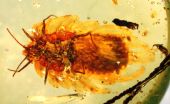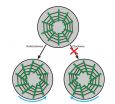(Press-News.org) Darwin's evolutionary theory predicts survival of the fittest. So why do different survival tactics co-exist, if evolution should always favour the winning strategy?
To answer that question scientists at the Universities of Bath and Manchester have been studying a single-celled amoeba, also known as slime mould, which displays certain behaviours that have been labelled as "cheating" or "cooperating".
In a study, published in the prestigious journal Current Biology, the team found that cheaters don't necessarily win in terms of overall survival, suggesting that biologists should re-evaluate how they define and measure social cooperation.
Their research has medical implications when it comes to developing therapies that use socially successful bacteria to fight diseases such as lung infections.
Professor Chris Thompson from Manchester's Faculty of Life Sciences explains: "If the cheats always win, then according to Darwin, altruism shouldn't exist. To study this we looked at why the single fittest strategy in the amoeba community doesn't dominate."
The team looked at how amoebae compete against each other during cooperative encounters. These strange microbes generally live in the soil as single cells, eating bacteria, but when food is limited, they clump together to form a 'slug' that moves to a different location before transforming into a fruiting body which eventually releases spores to produce the next generation of amoebae.
Development into a fruiting body requires cooperation, with some of the amoebae forming the stalk part of the fruiting body, effectively sacrificing themselves for the benefit of the ones that become spores. Therefore biologists have labelled the individuals that become the stalk as 'altruists', with the individuals that tend to form lots of spores being identified as 'cheats' because they benefit disproportionately.
However, the scientists from Bath and Manchester found that these assumptions don't necessarily tell the whole story. Those labelled as cheats don't end up having higher success than those that appear to lose since the cheats pay a price for their apparent success by producing larger numbers of lower quality spores. These inferior spores have lower survival rates, so overall the number of spores that survive is similar to those amoebae who 'cooperate'.
Professor Jason Wolf, from the University of Bath's Department of Biology & Biochemistry, explains: "Our study shows that whilst there are definitely winners and losers in social cooperation, you can't measure social success just by counting the number of spores these moulds produce. Those that produce lots of spores often make inferior ones that don't have any overall advantage over their competitors.
"Basically we need to look at the bigger picture when measuring social success, rather than making assumptions based on measuring the wrong things."
Professor Chris Thompson adds: "What our study says is that when we look at systems through just one aspect then that system can appear to be unbalanced and shouldn't work, but in reality we are a collection of many features that together determine our success, and so our variety helps to make us more equal."
He adds: "Our study threw up quite a big surprise because the way we measure fitness in a system is currently misleading. By focussing on the number of offspring (in this case spores) rather than the quality, we're using an incorrect measurement of success.
"What we thought of as socially successful needs to be re-evaluated."
INFORMATION:
Scientists at the University of Bonn, together with colleagues from China, UK and Poland, have described the oldest evidence of brood care in insects: it is in a female scale insect with her young that is encased in amber as a fossil. The approximately100-million-year-old "snapshot" from the Earth's history shows the six millimetre long tiny insect with a wax cocoon, which protected the eggs from predators and drying out plus associated young nymphs. The researchers are now presenting their results in the respected journal eLIFE.
The small female insect with the waxy ...
Face recognition security on smartphones can be significantly improved if users store an 'average' photo of themselves, according to new research by scientists at the University of York.
A research team led by Dr David Robertson, of the Department of Psychology's FaceVar laboratory at York, found that combining different pictures of the user, rather than a single 'target' image, leads to much better recognition across all kinds of daily settings. The research is published in the journal PLOS ONE.
The researchers examined the performance of the 'face unlock' system ...
Researchers at the Mechanobiology Institute (MBI) at the National University of Singapore have discovered that the inherent 'handedness' of molecular structures directs the behaviour of individual cells and confers them the ability to sense the difference between left and right. This is a significant step forward in the understanding of cellular biology. This discovery was published in Nature Cell Biology on 23 March 2015.
Cellular decision making
Our bodies are made up of hundreds of different types of cells, each of which performs a unique and highly specialized ...
Researchers from the UK and Malaysia have detected a human fingerprint deep in the Borneo rainforest in Southeast Asia. Cold winds blowing from the north carry industrial pollutants from East Asia to the equator, with implications for air quality in the region. Once there, the pollutants can travel higher into the atmosphere and impact the ozone layer. The research is published today in Atmospheric Chemistry and Physics, an open access journal of the European Geosciences Union (EGU).
Rainforests are often associated with pure, unpolluted air, but in Borneo air quality ...
WASHINGTON-- The Society for Public Health Education (SOPHE) proudly announces the publication of a Health Education & Behavior (HE&B) supplement devoted to the latest research and practice on policy and environmental approaches to foster healthy communities. The April 2015 supplement, "The Evidence for Policy and Environmental Approaches to Promoting Health," comprises a dozen peer-reviewed articles and two perspectives examining the state-of-the-evidence on what's working and what's needed at the community, institutional and societal levels to promote good health across ...
A world first study revealing the presence of two antibodies in a sub-group of children experiencing their first episode of psychosis affirms a longstanding recognition that auto-immune disorders play a significant role in psychiatric illness.
Antibodies defend the body against bacterial, viral, and other invaders but sometimes the body makes antibodies that attack healthy cells. In these cases, autoimmune disorders develop. These include conditions such as multiple sclerosis (MS), rheumatoid arthritis and Type 1 diabetes.
This 'immune hypothesis' is supported by new ...
Almost every pig carries harmless strains of the S. suis bacterium - such strains are known as 'commensal' strains. However, a more virulent group of strains of the bacteria also exist, which cause disease in pigs worldwide and are a major driver of antibiotic use for prevention. Increasingly, this group of strains is also implicated in serious human diseases such as meningitis and septicaemia.
In order to understand the genetic basis of disease in S. suis, an international study, led by the Bacterial Respiratory Diseases of Pigs-1 Technology (BRaDP1T) consortium, examined ...
New research from the University of Toronto has scientists re-thinking how a lethal fungus grows and kills immune cells. The study hints at a new approach to therapy for Candida albicans, one of the most common causes of bloodstream infections.
Previously, scientists thought that Candida albicans spread by changing from a single, round cell to a long string of cells, or filaments. They thought this shape change allowed the fungus to move through the bloodstream and let its filaments penetrate tissues and destroy immune cells.
But the new study, published today in Nature ...
Survey responses from 19,000 people in 18 European countries, including the UK, showed that "the notion that big welfare states are associated with widespread cultures of dependency, or other adverse consequences of poor short term incentives to work, receives little support."
Sociologists Dr Kjetil van der Wel and Dr Knut Halvorsen examined responses to the statement 'I would enjoy having a paid job even if I did not need the money' put to the interviewees for the European Social Survey in 2010.
In a paper published in the journal Work, employment and society they ...
PISCATAWAY, NJ - Children who get a taste of their parents' wine now and then may be more likely than their peers to start drinking by high school, according to a new report in the Journal of Studies on Alcohol and Drugs.
Researchers found that, of 561 students in a long-term study, those who'd "sipped" alcohol by sixth grade were five times more likely than their peers to down a full drink by the time they were in high school. And they were four times more likely to have binged or been drunk.
The findings do not prove that early sips of alcohol are to blame, said lead ...




